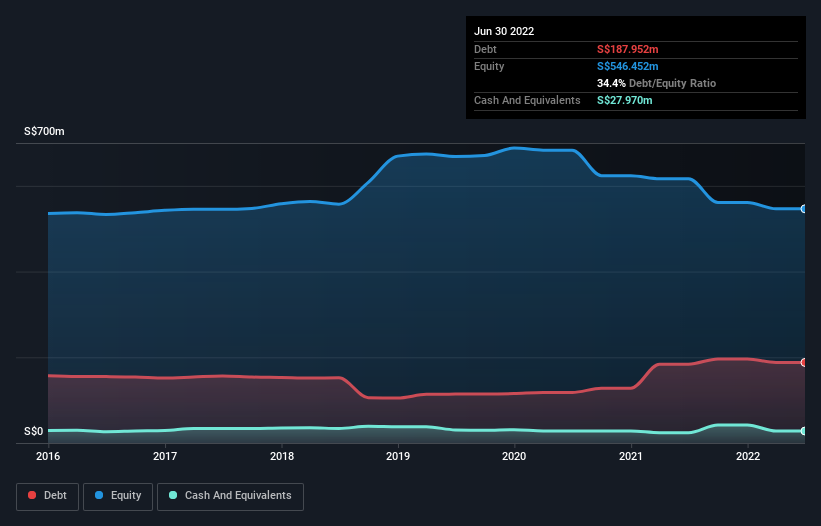
The external fund manager backed by Berkshire Hathaway's Charlie Munger, Li Lu, makes no bones about it when he says 'The biggest investment risk is not the volatility of prices, but whether you will suffer a permanent loss of capital.' When we think about how risky a company is, we always like to look at its use of debt, since debt overload can lead to ruin. As with many other companies Hotel Royal Limited (SGX:H12) makes use of debt. But is this debt a concern to shareholders?
When Is Debt Dangerous?
Debt and other liabilities become risky for a business when it cannot easily fulfill those obligations, either with free cash flow or by raising capital at an attractive price. In the worst case scenario, a company can go bankrupt if it cannot pay its creditors. However, a more frequent (but still costly) occurrence is where a company must issue shares at bargain-basement prices, permanently diluting shareholders, just to shore up its balance sheet. Of course, debt can be an important tool in businesses, particularly capital heavy businesses. The first step when considering a company's debt levels is to consider its cash and debt together.
Our analysis indicates that H12 is potentially overvalued!
What Is Hotel Royal's Debt?
The chart below, which you can click on for greater detail, shows that Hotel Royal had S$188.0m in debt in June 2022; about the same as the year before. However, it does have S$28.0m in cash offsetting this, leading to net debt of about S$160.0m.

How Strong Is Hotel Royal's Balance Sheet?
According to the last reported balance sheet, Hotel Royal had liabilities of S$19.5m due within 12 months, and liabilities of S$200.5m due beyond 12 months. On the other hand, it had cash of S$28.0m and S$2.85m worth of receivables due within a year. So its liabilities total S$189.1m more than the combination of its cash and short-term receivables.
This is a mountain of leverage relative to its market capitalization of S$242.9m. Should its lenders demand that it shore up the balance sheet, shareholders would likely face severe dilution. There's no doubt that we learn most about debt from the balance sheet. But it is Hotel Royal's earnings that will influence how the balance sheet holds up in the future. So if you're keen to discover more about its earnings, it might be worth checking out this graph of its long term earnings trend.
In the last year Hotel Royal wasn't profitable at an EBIT level, but managed to grow its revenue by 29%, to S$32m. Shareholders probably have their fingers crossed that it can grow its way to profits.
Caveat Emptor
Despite the top line growth, Hotel Royal still had an earnings before interest and tax (EBIT) loss over the last year. To be specific the EBIT loss came in at S$7.6m. Considering that alongside the liabilities mentioned above does not give us much confidence that company should be using so much debt. Quite frankly we think the balance sheet is far from match-fit, although it could be improved with time. However, it doesn't help that it burned through S$8.0m of cash over the last year. So to be blunt we think it is risky. There's no doubt that we learn most about debt from the balance sheet. But ultimately, every company can contain risks that exist outside of the balance sheet. For example - Hotel Royal has 2 warning signs we think you should be aware of.
At the end of the day, it's often better to focus on companies that are free from net debt. You can access our special list of such companies (all with a track record of profit growth). It's free.
Valuation is complex, but we're here to simplify it.
Discover if Hotel Royal might be undervalued or overvalued with our detailed analysis, featuring fair value estimates, potential risks, dividends, insider trades, and its financial condition.
Access Free AnalysisHave feedback on this article? Concerned about the content? Get in touch with us directly. Alternatively, email editorial-team (at) simplywallst.com.
This article by Simply Wall St is general in nature. We provide commentary based on historical data and analyst forecasts only using an unbiased methodology and our articles are not intended to be financial advice. It does not constitute a recommendation to buy or sell any stock, and does not take account of your objectives, or your financial situation. We aim to bring you long-term focused analysis driven by fundamental data. Note that our analysis may not factor in the latest price-sensitive company announcements or qualitative material. Simply Wall St has no position in any stocks mentioned.
About SGX:H12
Hotel Royal
An investment holding company, operates in the hotelier business in Singapore, Malaysia, Thailand, and New Zealand.
Acceptable track record with imperfect balance sheet.
Market Insights
Community Narratives




